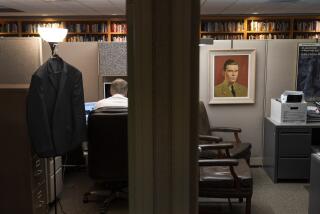Ed Janss and Birch Society
- Share via
The death of a former friend (Ed Janss) and the demise of a former foe (the John Birch Society) were reported in the same issue of the Los Angeles Times (March 19). The conjunction of these two seemingly unrelated events brought back a memory that seems worthy of sharing with others.
As Ed and I were driving back to Los Angeles after a meeting in Santa Barbara, we chatted about the public event in which we would be playing an active role, a convocation sponsored by the Center for the Study of Democratic Institutions. Speaking quite seriously, Ed announced to me that at least one member of the John Birch Society would be in attendance. When I asked how he knew that, his response was: “Because I am planning to bring my mother.”
Which is exactly what he did.
All this happened 20 years ago, a time when “Birchers” as we called them, were particularly numerous--and very vocal--in the Santa Barbara area, where the center, led by Robert Hutchins, was based. Indeed, expulsion of the center from the area was a high priority and an incessant activity for the John Birch Society.
And as Ed Janss explained to me that day, his mother was a member in good standing of this organization which was so bitterly opposed to a group on whose board of directors Ed Janss was now serving.
Ed had just turned 50, he told me, and for as long as he could remember his family’s politics were, in his words, “to the right of Attila the Hun.” He had been reared on slogans such as “Better Dead Than Red”--and now he had decided to attach himself to an organization whose leader excoriated sloganeering as a substitute for thinking, a leader known to be a sociopolitical iconoclast, a leader sure to be seen as the enemy by Ed’s mother and other members of the Janss family.
Despite all this, Ed Janss actively supported a group of business executives opposing our country’s involvement in Vietnam; this at a time when it wasn’t popular to take such a stand.
Moreover, he participated in the 1968 Democratic Convention, working actively to have the convention adopt an anti-Vietnam plank.
As I think back, I realize how courageous this man had to be, how astonishingly open-minded to make a political U-turn at the age of 50. And I find myself respecting him even more deeply than I did 20 years ago.
HAROLD WILLENS
Los Angeles
More to Read
Sign up for Essential California
The most important California stories and recommendations in your inbox every morning.
You may occasionally receive promotional content from the Los Angeles Times.












